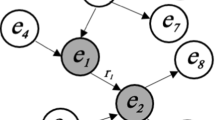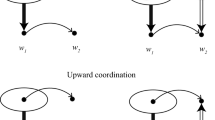Abstract
When initial data are not sufficient to accomplish inference in a knowledge-based system, more information may be needed. The task of inference guiding or question-asking in that situation is to select missing information to confirm. We present an inference guiding method for propositional knowledge-based systems. Our computational experiments show that the new method is significantly better than the methods currently used in many knowledge-based systems.
Similar content being viewed by others
References
A. Colmerrauer, An introduction to PROLOG III, Communications of the ACM 33(7) (1990) 69–90.
W.F. Dowling and J.H. Gallier, Linear time algorithms for testing the satisfiability of Horn formulae, Journal of Logic Programming 3 (1984) 267–284.
R. Duda, J. Gasching and P. Hart, Model design in the PROSPECT consultant system for mineral exploration, in: Expert Systems in the Micro-Electronic Age(Edinburgh Univ. Press, UK, 1979).
J. De Kleer and B.C. Williams, Diagnosing multiple faults, Artificial Intelligence 32 (1987) 97–130.
M.R. Garey and D.S. Johnson, Computers and Intractability(Freeman, New York, 1979).
J. Gu, P.W. Purdom, J. Franco and B.W. Wah, Algorithms for satisfiability (SAT) problem: A survey, in: DIMACS Series in Discrete Mathematics and Theoretical Computer Science, Vol. 35, Satisfiability Problems: Theory and Applications, eds. D. Du, J. Gu and P.M. Pardalos (Amer. Math. Soc., Providence, RI, 1997) 19–152.
F. Hates-Roth, D.A. Waterman and D.B. Lenat, Building Expert Systems(Addison-Wesley, Reading, MA, 1983).
J. Ignizio, An Introduction to Expert Systems(McGraw-Hill, 1991).
R. Jeroslow and J. Wang, Solving propositional satisfiability problems, Annals of Mathematics and Artificial Intelligence 1 (1990) 167–187.
G.F. Luger and W.A. Stubblefield, Artificial Intelligence and the Design of Expert Systems(Benjamin/Cummings, 1989).
C.S. Mellish, Generalized alpha-beta pruning as a guide to expert system question selection, in: Expert System ’85, Proceedings of the Fifth Technical Conference of the British Computer Society Specialist Group on Expert Systems, Univ. of Warwick (Cambridge Univ. Press, Cambridge, 1985) pp. 31–41.
E. Triantaphyllou and J. Wang, The problem of asking the minimum number of questions in Horn clause systems, Mathematical and Computer Modeling 20(9) (1994) 75–87.
J. Wang, Identifying key missing data for inference under uncertainty, International Journal of Approximate Reasoning 10 (1994) 287–309.
J. Wang, A weight-balanced branching rule for SAT, Department of Business and Economics, Missouri Western State College (December 1996).
J. Wang and E. Triantaphyllou, A cost-effective question-asking strategy for propositional knowledge-based systems, Annals of Mathematics and Artificial Intelligence, to appear.
J. Wang and J. Vande Vate, Question-asking strategies for Horn clause systems, Annals of Mathematics and Artificial Intelligence 1 (1990) 359–370.
Author information
Authors and Affiliations
Rights and permissions
About this article
Cite this article
Wang, J. Inference guiding in propositional knowledge bases. Annals of Mathematics and Artificial Intelligence 23, 345–356 (1998). https://doi.org/10.1023/A:1018984712480
Issue Date:
DOI: https://doi.org/10.1023/A:1018984712480




